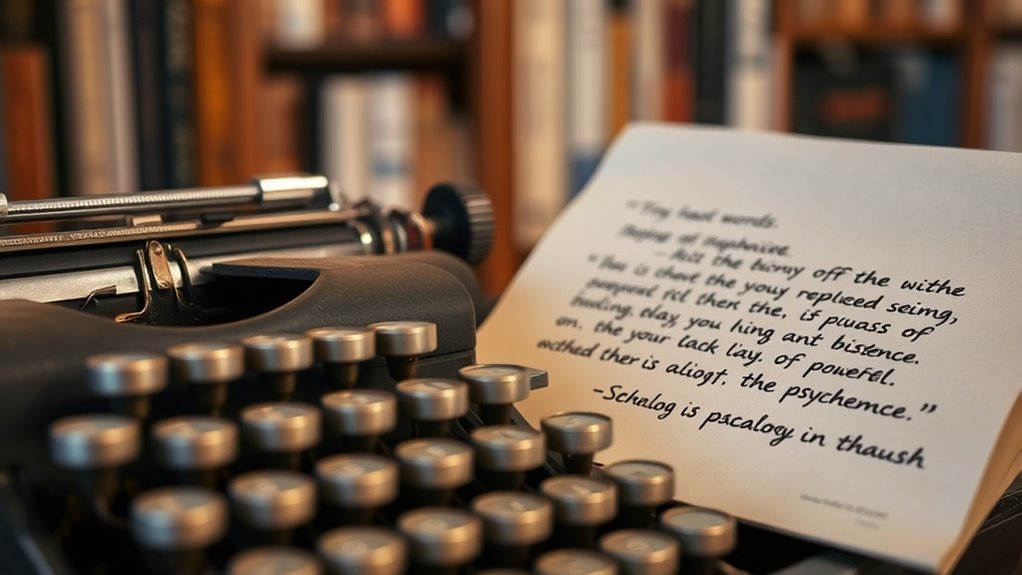Memorable quotes stick because they evoke strong emotions and connect with your personal experiences or universal truths. They often use rhythmic language, like rhyme or repetition, making them pleasing and easy to recall. Clear, simple messages also help your brain process and remember the words better. When a quote resonates emotionally and linguistically, it’s more likely to stay with you over time. Keep exploring these patterns to discover what makes some words truly unforgettable.
Key Takeaways
- Memorable quotes evoke strong emotional responses, strengthening long-term memory retention through personal and universal relevance.
- Rhythmic patterns, alliteration, rhyme, and parallelism create musicality that enhances recall and engagement.
- Simplicity and clarity in language facilitate quick understanding and make messages more memorable.
- Quotes reflecting internal beliefs or challenging perspectives resonate emotionally, forging deeper cognitive connections.
- The combination of emotional impact and linguistic patterns contributes to the timeless influence of certain quotes.

Memorable quotes have a powerful way of sticking with us, shaping our thoughts and inspiring action long after we hear them. This lasting impression isn’t random; it’s rooted in the psychological impact words have on our minds. When you encounter a quote that resonates, it often triggers emotional responses, making the message more memorable. The way these words are crafted influences their staying power, and understanding the role of linguistic patterns can help explain why some quotes stick while others fade away.
Memorable quotes resonate emotionally, shaped by linguistic patterns that ensure they stick in our minds.
Linguistic patterns play a vital role in making quotes memorable. Simple, rhythmic, and repetitive language tends to be more engaging and easier to recall. Think about how alliteration, parallelism, or rhyme can enhance a quote’s impact. These patterns create a musical quality that your brain naturally gravitates toward, making the words more pleasant and easier to remember. When a quote employs these techniques, it taps into your brain’s preference for harmony and predictability, reinforcing its message and increasing its staying power.
Beyond just the sound, the psychological impact of a quote also hinges on how well it connects with your personal experiences or universal truths. When you hear a quote that aligns with your beliefs or challenges your perspective, it sparks a deeper cognitive and emotional response. This connection makes it more likely for you to remember the quote because it’s not just a string of words, but a reflection of your internal world. The emotional resonance amplifies the quote’s influence, embedding it into your memory and possibly even shaping your future thoughts and actions.
Furthermore, the clarity and simplicity of a quote contribute enormously to its memorability. If the message is straightforward and easy to grasp, your brain doesn’t have to work as hard to process it. Complex or convoluted language often loses its impact because it demands extra cognitive effort. Memorable quotes often distill complex ideas into concise, powerful statements, which enhances their psychological impact by making them accessible and quick to recall.
In essence, the combination of effective linguistic patterns and the psychological impact they evoke explains why some quotes become timeless. They resonate on an emotional level, are easy to process, and employ rhythmic or memorable language techniques. When you recognize these elements in a quote, you understand why it sticks with you—because it’s crafted not just to be heard, but to be remembered.
Frequently Asked Questions
How Do Cultural Differences Influence Quote Memorability?
You might notice that cultural differences shape how memorable quotes are because cross-cultural perceptions influence what resonates with you. Linguistic relativity suggests language shapes thought, so a quote’s impact varies across cultures. When you encounter a phrase rooted in specific cultural references or values, it’s more likely to stick if it aligns with your cultural context. Understanding these differences helps explain why some quotes resonate universally while others are culturally bound.
Can Visual Imagery Enhance the Stickiness of a Quote?
Imagine a vivid garden where words bloom like colorful flowers. Visual metaphors and sensory language transform quotes into memorable images, making them easier to recall. When you use these tools, your message becomes a lively scene in the mind, enhancing its stickiness. Visual imagery acts like a gentle breeze that carries your words further, ensuring they resonate and stay with your audience long after they’ve heard them.
What Role Does Emotional Resonance Play in Memorability?
Emotional resonance plays a vital role in making quotes memorable because it triggers emotional responses that deepen your connection. When words evoke strong emotional triggers and feel personally relevant, you’re more likely to remember them. You naturally focus on content that sparks feelings, which enhances recall. So, if a quote resonates emotionally with you, it sticks better because your brain associates it with meaningful experiences or feelings.
Are There Specific Linguistic Patterns That Improve Quote Retention?
You notice that certain linguistic patterns, like rhyme schemes and rhythmic patterns, help you remember quotes better. When a quote has a catchy rhyme or a steady rhythm, it sticks in your mind more easily. These patterns create a musical quality that makes words resonate, making it easier for you to recall them later. So, using rhyme schemes and rhythmic patterns can considerably boost the memorability of a quote.
How Does Repetition Affect the Lasting Impact of a Quote?
Repetition frequency plays a key role in how you remember a quote, as hearing or seeing it multiple times reinforces its message. When the phrase is simple, it’s easier to recall and more impactful. You’re more likely to remember a quote that’s repeated often and uses straightforward language, making it stick in your mind longer. So, keep repetitions consistent and choose clear, simple phrases to boost retention.
Conclusion
Now that you know what makes quotes stick—like emotional impact, rhythm, and simplicity—aren’t you curious to craft your own memorable words? Whether you’re inspiring others or simply sharing a moment, using these science-backed tricks can make your words resonate long after they’re spoken. So, next time you want your message to truly stick, ask yourself: are you giving your words the power to be unforgettable? After all, great quotes start with you.










